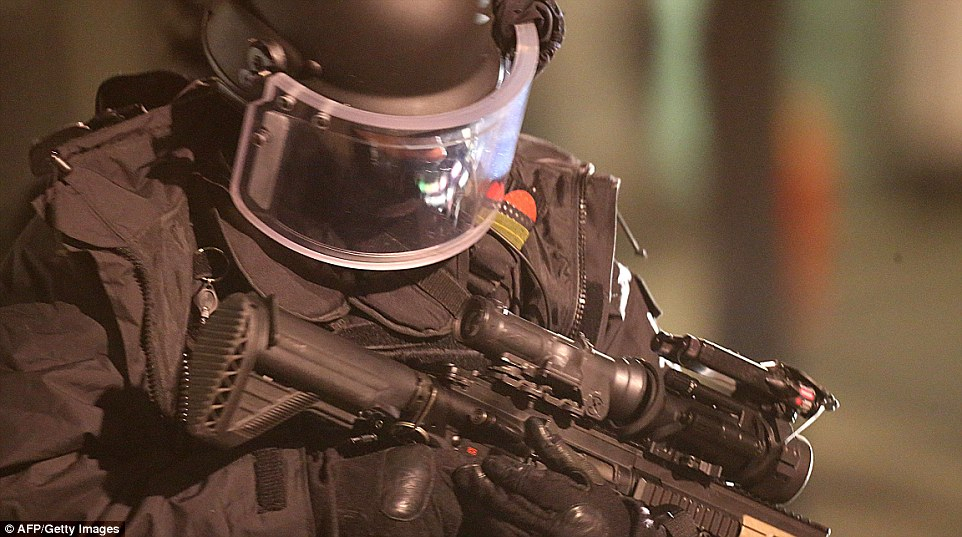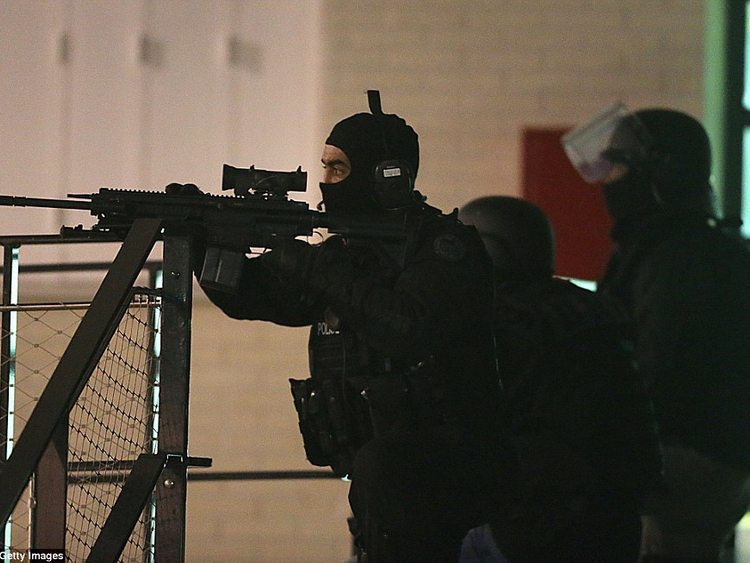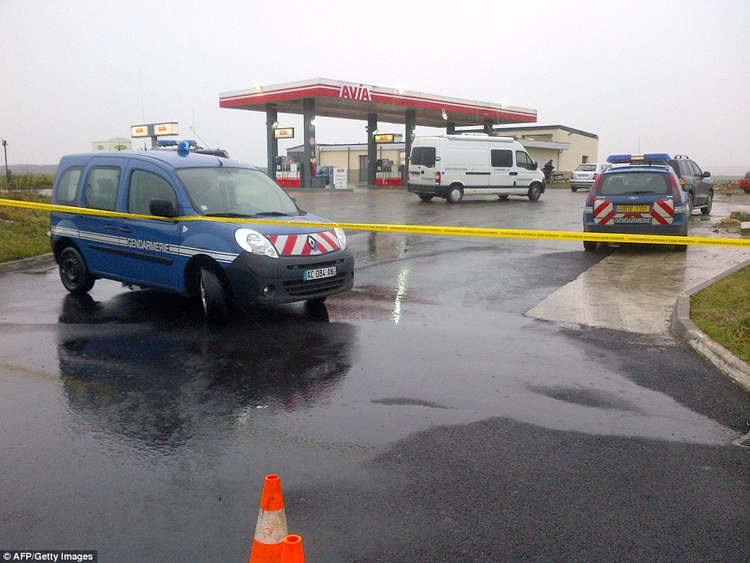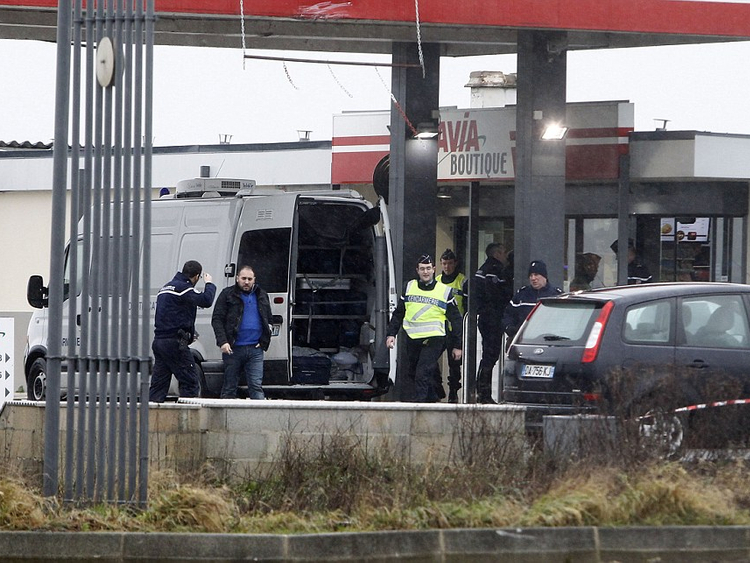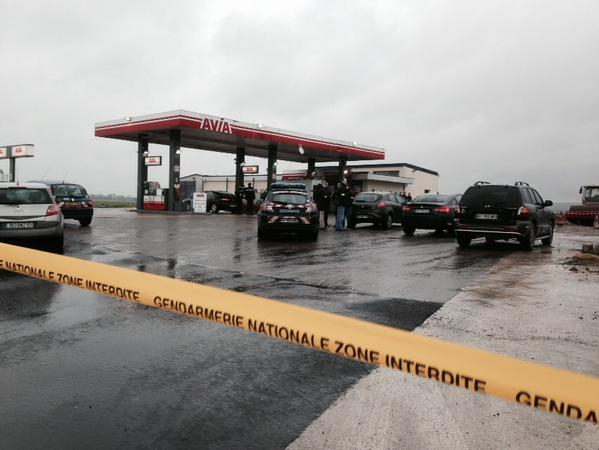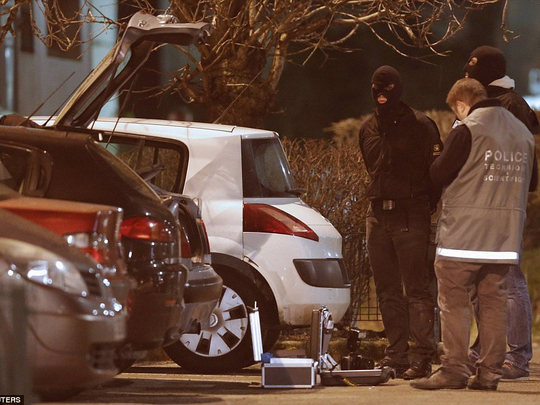
Paris: One of the three suspects believed involved in the massacre at the French satirical weekly "Charlie Hebdo" has surrendered to police in the town of Charleville-Mezieres near the border with Belgium, authorities said Thursday.
Hamyd Mourad, 18, surrendered after allegedly collaborating in the attack carried out by brothers Said and Cherif Kouachi, according to police who have launched a country-wide dragnet for the pair.
In the attack, two masked gunmen burst into the magazine's Paris office Wednesday, killing 12 people, including the editor of "Charlie Hebdo" and three acclaimed cartoonists, and wounding more than 20 other people before making a well-planned getaway.
"Charlie Hebdo" had been the target of attacks in the past by Islamists deeply angered by its satirical treatment of the Prophet Muhammad and the Muslim religion.
Mourad gave himself up shortly before midnight Wednesday after seeing his name circulating on social network websites, according to French press reports.
Meanwhile, the Metronews daily reported that Cherif Kouachi was tried in 2005 for being part of a cell that sends
jihadis to Iraq.
He was sentenced to three years in jail but served only half the term.
French Prime Minister Manuel Valls said Thursday that several people were arrested late Wednesday in Paris.
"Several (suspects) were held overnight," Valls told RTL radio, adding that preventing another attack "is our main concern".
The French government has raised its terrorist alert to the highest level and has mobilised more than 3,000 members of the security forces in the search operation for the Kouachi brothers.
Meanwhile, agencies reported that armed suspects had robbed a petrol station in northern France, 50 km north of Paris, which may be related to the newspaper massacre.
From the scene at the petrol station robbed by armed suspects in N France #JeSuisCharlie pic.twitter.com/vjGHlu3Q28— Sophie Garratt (@SophGarratt) January 8, 2015
Several suspects arrested
French police arrested several people overnight in connection with the attack on a satirical magazine in Paris that left 12 people dead and the nation in shock.
As France held a day of mourning for the victims of the Charlie Hebdo attack, tension increased after a female police officer died in a separate shooting in Montrouge, in the southwest of Paris on Thursday.
Witnesses described how shortly after 8am a man dressed in black got out of a car and opened fire with automatic weapons. Another person was injured in the incident.
It is not clear if the shooting was related to Wednesday's attack. Bernard Cazeneuve, interior minister, said at the scene that people should not jump to conclusions about it and that the gunman was still at large.
Officials did not say if the people arrested overnight included Said and Cherif Kouachi, aged 32 and 34, whom the authorities suspect may have carried out the attack.
Announcing the arrests, Manuel Valls, the prime minister, said in an interview with RTL radio that preventing another attack "is our main concern" and appealed for witnesses to come forward. French media put the number of people detained at seven.
A third suspect, 18-year-old Hamyd Mourad, was being questioned in Charleville-MEzieres, about 145 miles northeast of Paris, after turning himself into police. He is suspected of helping the brothers with the logistics of the attack, according to French media.
Heavily armed police searching for the suspects raided a block of flats in the town of Reims, east of Paris, late on Wednesday night but did not find them.
France observed a minute's silence at midday across the country, the bells of Notre Dame cathedral in Paris tolled and flags will fly at half mast or be tied with black ribbons for three days.
President Francois Hollande met his predecessor, Nicolas Sarkozy, on Thursday in the first of several meetings with politicians from across the political spectrum to build unity in response to the attack.
Mr Sarkozy said afterwards: "It was a declaration of war on civilisation. Faced with barbarity, civilisation must defend itself."
On Wednesday night thousands gathered in the Place de la Republique in Paris, symbolic of French democracy, to demonstrate against the assault and affirm their support for freedom of the press. Similar vigils took place in cities across France and Europe - including London, Berlin and Rome.
Mourners lit candles and bore makeshift placards bearing what are becoming the defining words in response to the tragedy: "Je suis Charlie".
The apparently well-planned attack on the offices of Charlie Hebdo, under police protection for years because of its repeated mocking of Islam, is one of the deadliest terrorist assaults on European soil in recent years.
It followed months of warnings by the French government of the risk of terrorism from Islamist militants.
Two gunmen entered the magazine's offices on Wednesday morning, opening fire with automatic weapons. Eight journalists, including four of Charlie Hebdo's best-known cartoonists, and two policemen were among the dead. The attackers escaped in a car, later found abandoned in the northeast of the capital.
Paris prosecutor Francois Molins quoted a witness as saying at least one of the assailants shouted "God is great" in Arabic during the attack.
The nature of the attack is likely to raise concerns for European security chiefs. The fact that more than one gunman was involved - and that automatic weapons were used - implies a greater degree of planning and co-ordination than would have been the case for a lone assailant, according to one European security official.
Worst terrorist attack
If confirmed as the work of militants, it would rank as the worst such terrorist attack in Europe since suicide bombers struck in London in July 2005, killing 52 people.
French ministers have frequently warned in recent months of the risk of attacks by homegrown jihadis. Officials say about 1,000 French citizens or residents have been involved in jihadi movements in Syria and Iraq, the most from any European country.
A Frenchman, Mehdi Nemmouche, who spent a year in Syria, was captured and charged with the killing of three people at the Brussels Jewish museum last May.
According to French media, this is at least the third time Cherif Kouachi has been wanted by the police. In 2005, he was arrested as part of the "Filiere des Buttes Chaumont" group, named after the leafy park in Paris's 19th arrondissement near where they met to recruit jihadis to fight in Iraq.
A former pizza delivery man, Cherif was detained as he and others in the group prepared to fly to Damascus, Syria. In 2008 he was sentenced to three years in prison, including 18 months he had already served.
Cherif said during the trial that he was inspired by the abuse of inmates by US troops at Baghdad's Abu Ghraib prison.
The Paris attack comes against the backdrop of rising political tensions in France and elsewhere in Europe over immigration and the perceived growing influence of radical Islam.
Support is growing for the far-right National Front in France, led by Marine Le Pen, which campaigns angrily on these issues. The attack also followed big demonstrations in Germany by Pegida, a new rightwing "anti-Islamisation" movement.
Mr Hollande, who went to the scene after the attack, said France was in a state of shock, describing the shooting as "an act of exceptional barbarity".
"We are at a very difficult moment. Several terror attacks have been prevented in the previous weeks," Mr Hollande said. "We are threatened because we are a country of freedom."
President Barack Obama led international condemnations, praising France for standing with the US against terrorism. He added: "For us to see the kind of cowardly evil attacks that took place today I think reinforces once again why it's so important for us to stand in solidarity with them, just as they stand in solidarity with us."
Among those killed at Charlie Hebdo was Stephane Charbonnier, its leading editorial figure, who was known as Charb. He had led Charlie Hebdo's unrepentant caricaturing of Islam and other religions in recent years.
The magazine, long accustomed to threats, was physically attacked for the first time in 2011, when a petrol bomb destroyed its offices.
Charlie Hebdo editor made erovocation his mission
Stephane Charbonnier, the editorial director of the French satirical newspaper Charlie Hebdo, was often pictured with his fist aloft.
Charbonnier, 47, a cartoonist known professionally as Charb, was among 12 people killed Wednesday when gunmen attacked his newspaper's offices in Paris. He had been instrumental in a series of defiant campaigns that divided public opinion: Some saw them as powerful stands for free speech, and others as needless provocations.
"Is it really sensible or intelligent to pour oil on the fire?" asked Laurent Fabius, the foreign minister at the time, when he closed French embassies, consulates, cultural centers and schools in about 20 countries.
Charbonnier did not see it in those terms, those who knew him and who had followed his magazine's work said. It was, for him, a matter of freedom to think and speak as one wished, said Daniel Leconte, who made a documentary about Charlie Hebdo and its battles.
"They were so friendly, so funny," Leconte said, describing a team of artists led by Charbonnier. "They were not doctrinaire at all. They liked liberty, they liked freedom," he said. "I don't really understand what kind of people would want to kill them."
The group worked closely together and had dinner together, said Francoise Mouly, the art editor of The New Yorker, who was born in France and grew up reading Charlie Hebdo and its predecessors.
"They weren't hiding behind their drawings. They knew the dangers," she said. "There had been firebombs and threats. They were actually defying a gag order given to them by extremists."
Charbonnier, who had appeared on a list of al-Qaida's targets, was under police protection, though he told Le Monde, the French daily, that as a single man he did not fear retaliation, and that however pompous it might sound, he would rather "die standing than live on my knees."
When the French prime minister in 2012, Jean-Marc Ayrault, said that the government would block a series of protests planned by Muslims, Charbonnier defied that too.
"Why should they prohibit these people from expressing themselves?" Charbonnier said at the time. "We have the right to express ourselves; they have the right to express themselves, too."
Charbonnier, a slight man with thick glasses, had worked at Charlie Hebdo for more than 20 years, he said in an interview with Al-Jazeera English in 2012. For that entire time, he said, the newspaper had been "provocative on many subjects."
A recent cartoon by Charbonnier, shared on social media Wednesday, appeared gruesomely prophetic.
It pictured a hapless-looking man, dressed in the style of many extremists, under the words "still no attacks in France." The extremist, in a speech bubble, pointed out that he had until the end of January to present his New Year's wishes.
Among the dozen people killed Wednesday were two of the magazine's founding cartoonists, Jean Cabut, 76, who used the pen name Cabu, and Georges Wolinski, 80. Also killed was Bernard Verlhac, 57, who used the pen name Tignous.
"To have cartoonists slaughtered for publishing cartoons is something we haven't seen since the 18th century," Mouly said.
The 45-year-old newspaper, part of a long tradition in France of using satire and humour, regularly singles out politicians, the police, bankers, religion and religious figures - from popes to prophets. This week's issue included a mock debate about whether Jesus exists.
"They were troublemakers for my entire life," Mouly said.
The newspaper was born in controversy in 1970 when a publication called Hara-Kiri, where Cabut and Wolinski had worked, folded after coming under criticism for mocking the death of Charles de Gaulle. Its staff pivoted to set up a new weekly, Charlie Hebdo - Charlie Weekly - a reference to its reprint of Charlie Brown cartoons from the United States.
The paper's founding "was the moment when cartoonists became important in French culture," Mouly said.
Although its circulation is only around 30,000, Charlie Hebdo has stirred national - even global - controversy and has drawn the anger of some Muslims on more than one occasion. In 2006, the newspaper reprinted cartoons of Muhammad first published by a Danish newspaper, Jyllands-Posten, prompting a lawsuit from French Muslim groups.
Cartoons, Mouly said, may prompt more widespread anger than words do because "they're meant to function in an iconic way that can be read across languages." She added, "They're meant to poke at the establishment. You don't do a cartoon to reinforce ideas so much as to challenge them."
After the attack in 2011, Charbonnier worried about the future of the newspaper, but it persevered and continued to stoke controversy.
"He really thought these people were very stupid," Leconte said.
Cartoonists elsewhere were shaken to once again find themselves targets of extremist violence.
"It is so out of proportion with the actual impact they had," Mouly said. "But this on the other hand is the same kind of thinking that has fundamentalists killing children."


